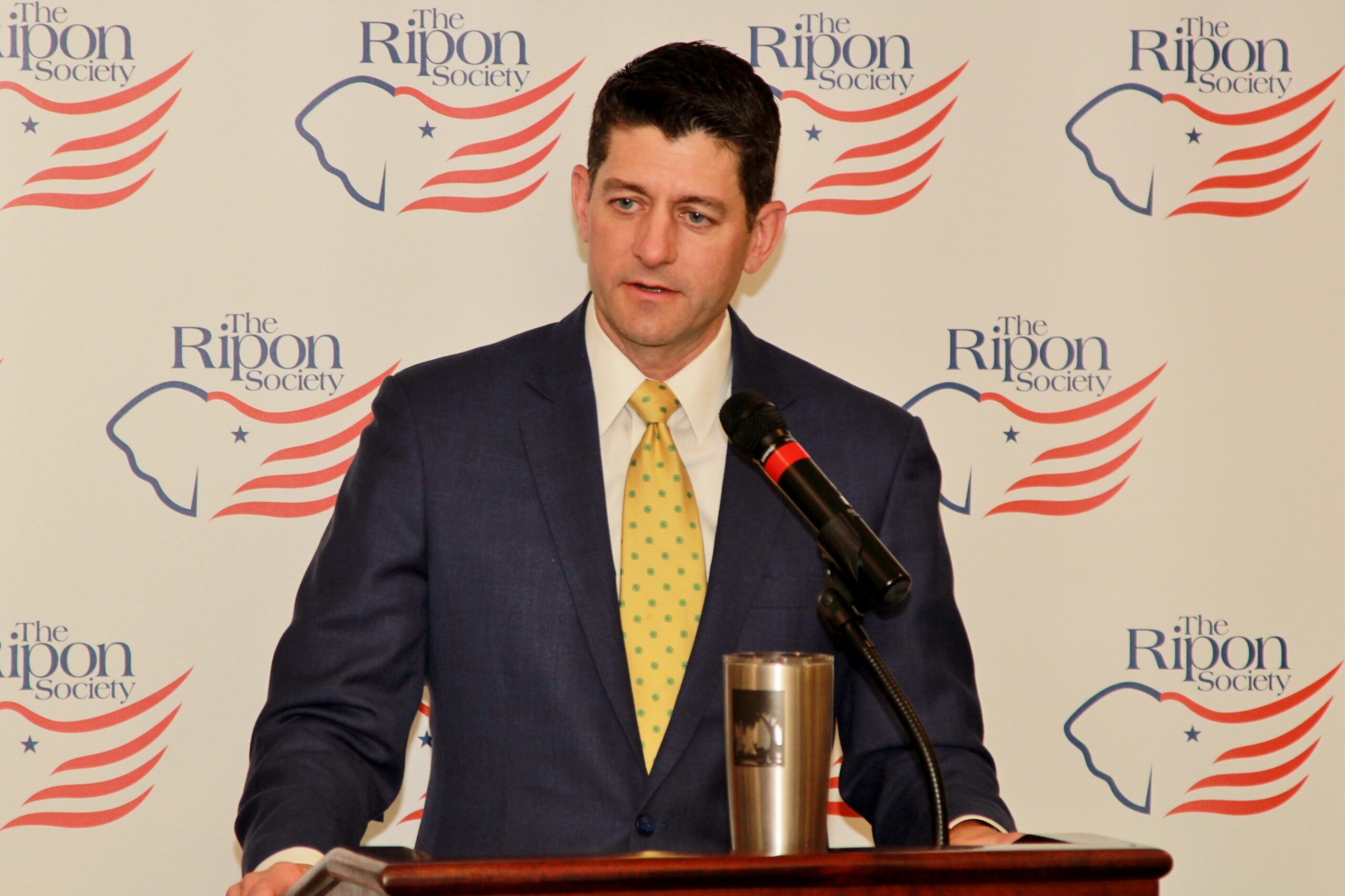 Speaker Ryan Lays Out Priorities for the Remainder of the Year
Speaker Ryan Lays Out Priorities for the Remainder of the Year
WASHINGTON, DC – Speaker Paul Ryan (WI-1) appeared before a breakfast meeting of The Ripon Society yesterday morning, delivering remarks about GOP prospects heading into the mid-terms, and the congressional agenda between now and the end of the year.
“I actually feel really good about our majority,” the Speaker stated. “If the election were held today, we would keep this majority … We have caucuses and factions. But at the end of the day, we are putting up 218 on our agenda. And that’s really what matters.”
Ryan, who announced in April that he will be retiring at the end of the year, was first elected in 1998 and has served as Speaker since October 2015. In his remarks, he talked about the quality of Republican candidates who are being elected to office, and how that has helped produce a “workhorse majority” on Capitol Hill.
“We are getting more effective conservatives and more effective legislators,” Ryan declared. “I was just talking to the Majority Whip from West Virginia who was a bison farmer and who just won the Evan Jenkins District. She is coming here to get things done. She is coming here to be a part of the solution. That’s what we want. We want people who are coming here to be effective, people who are coming here to be workhorses. I really believe that’s the kind of majority we are maturing into — a workhorse majority.”
Ryan also pointed to the Better Way agenda, which was first introduced in 2016, as one of the reasons that House Republicans are becoming more effective as a majority and starting to see results.
“There’s a specific plan for our economic agenda that we are in the middle of executing,” he said, referring to the Better Way blueprint. “You turn on the TV, and you may not see that. But when you look at what we are doing, it was always regulatory relief first. Then we wanted to do our entitlement reform bill, which we think is really important. Unfortunately, that did not pass the Senate, but we didn’t let that stop us in our tracks. We moved on to tax reform. Then we knew we wanted to rebuild our military and get the VA back on track. So we did that.”
The Speaker noted that rebuilding America’s infrastructure also remains a priority, adding that the House took a step in that direction last month by coming together to approve – in an overwhelming vote of 393-13 — a plan to reauthorize the FAA.
He further noted that helping Americans reenter the workforce is also critical, and something he hopes can be accomplished as the economy continues to grow.
“We’ve got to close the skills gap and the opportunities gap,” the Speaker declared. “That’s career and technical education reform. That’s getting the 12 million able-bodied people who are on the sidelines in poverty off of welfare and into the workforce, because there are 6.6 million jobs that are available.”
According to Ryan, Congress took a step in this direction when it approved the Tax Cuts and Jobs Act, which contained a provision that will create Opportunity Zones across America. He credited U.S. Sen. Tim Scott (R-SC) and former U.S. Rep. Pat Tiberi (OH-12) for championing the provision, and said it will help revitalize communities that have been left behind in the recovery over the past few years.
“Those two guys picked up this bill, worked it, and we made sure this was in tax reform,” the Speaker said of Scott and Tiberi. “What a lot of people in this country do not know is that a person can take an asset and sell it and not pay a capital gains tax on it. They can roll that gain into an Opportunity Zone, meaning 25% of the poorest census tracts in America are now Opportunity Zones. So you can take that asset and sell it and put that proceed into an investment in these poor communities. And if you keep your investment in these poor communities — revitalizing and employing and helping — you keep it there for 10 years, you pay no capital gains tax on it.
“We really believe that with the $6 trillion of unrealized capital gains, we can redeploy some of that capital into our poorest communities in America — into poor rural areas and poor urban areas. You combine that with social impact bonds — which are also part of this tax bill — and with our career and technical education and with the bill that was marked up yesterday on prison reform in the Judiciary Committee. We are focused on making sure that the least among us — the people who are slipping through the cracks — get the opportunity they need. We need them and we need their talent. We want them in our society, in our businesses, and in our communities to flourish. That is really the capstone of our agenda, and we are very excited about getting this done and running through the tape.”
Following his remarks, the Speaker took a number of questions, including one about the prospects for immigration reform this year.
“I really want to do something on immigration this year,” he stated. “It is absolutely broken. There is so much uncertainty among the DACA kids, and we do have a border problem. We have been laboring for months to try and get 218 on an immigration bill. That has been challenging. We are working on what I would call plan B, which is to work with the Administration to get them to support a plan that I think most people can support on DACA and security. So we are not going to give up on DACA.
“What really bothered me about that is that we lost our deadline. The way Congress works – I’ve learned this as Speaker — is you’ve got to have pretty good deadlines to force people to come together, to force them to make compromises, to then get something to the floor. We used the end of the year as that for tax reform. Deadlines on Omnis, and on appropriations, and expiring provisions like FAA – those work. When the Supreme Court took away our March 5th deadline on DACA, it killed us, because we were really close to getting Republicans and Democrats — rank and file members — to come up with an agreement.
“As soon as the court took away that deadline, those Democrats we were talking to walked away. They basically reached the conclusion that they prefer to have the issue than a solution. That set us back a bit. So we are going to try and still force the issue. I really want to get a down payment on immigration reform, and I think DACA and security is a good start on that. Then it would be nice to get on to these visa issues, whether it is agriculture or high-skilled.”
Ryan was also asked about the challenge of communicating the Republican success story given the national news environment right now.
“We are never going to win the national narrative with what is going on right now,” he stated bluntly. “We have got to communicate to two million people. Two million people in 50,000 person increments in 30-35 Congressional Districts that will make or break this majority. That is what we are going to do.
“So I am not going to spend all of our time and resources trying to convince CNN and MSNBC to talk about the House Republican agenda. That ain’t gonna happen — we will kill ourselves trying. But I can communicate specifically to the people who are the swing voters in those Districts that are going to return our majority, and that is what we are focused on doing.”
To view Ryan’s remarks before The Ripon Society breakfast discussion yesterday morning, please click on the link below:
The Ripon Society is a public policy organization that was founded in 1962 and takes its name from the town where the Republican Party was born in 1854 – Ripon, Wisconsin. One of the main goals of The Ripon Society is to promote the ideas and principles that have made America great and contributed to the GOP’s success. These ideas include keeping our nation secure, keeping taxes low and having a federal government that is smaller, smarter and more accountable to the people.



